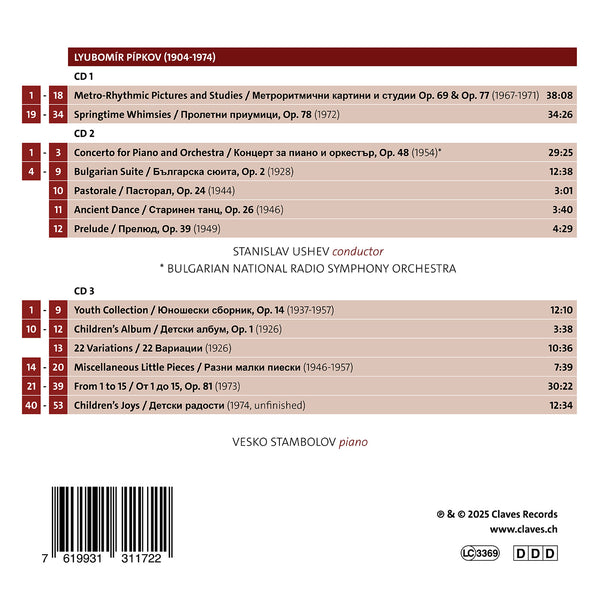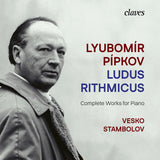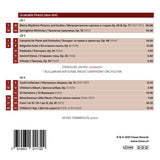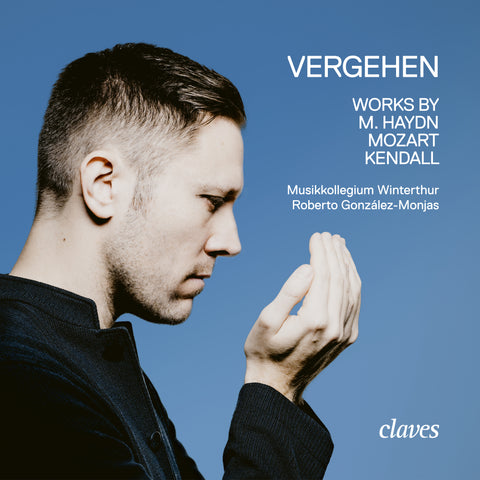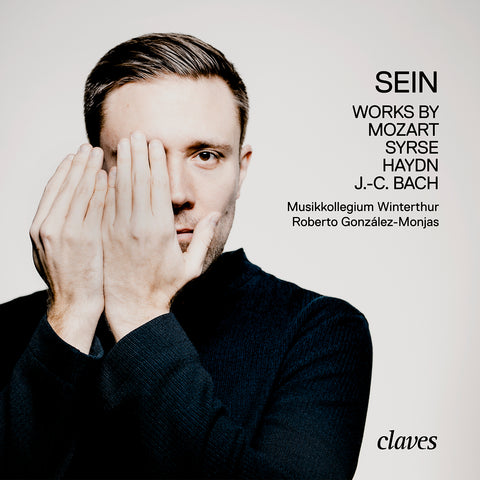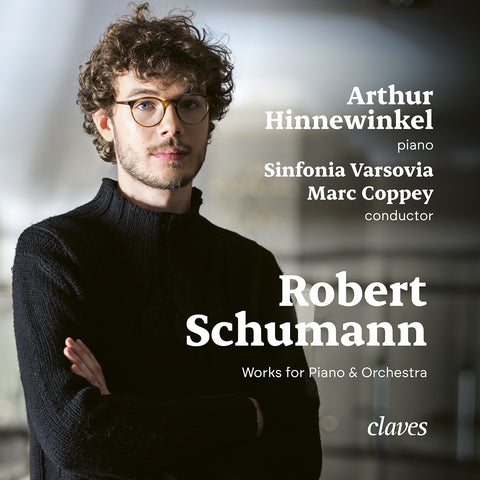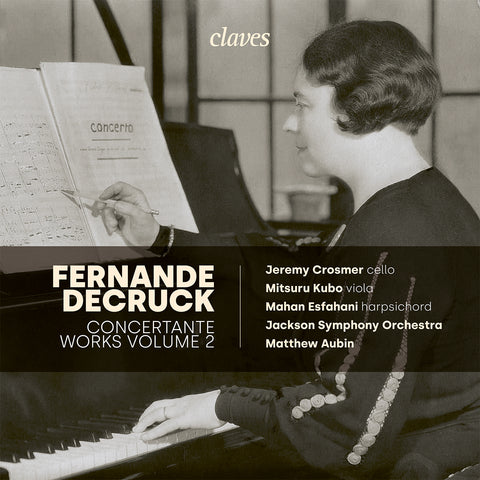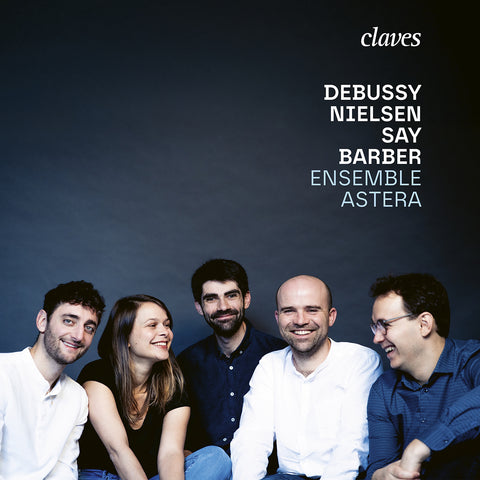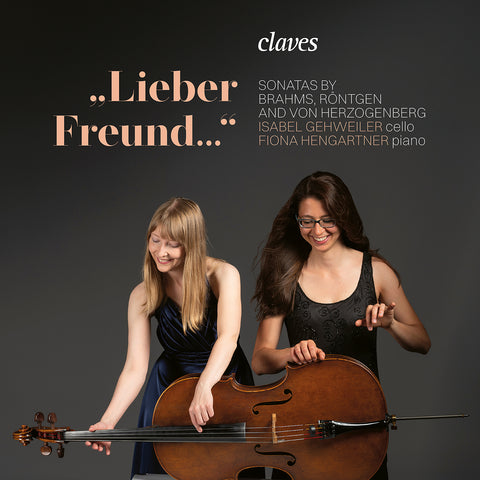(2025) Lyubomír Pípkov: Ludus Rithmicus, Complete Works for Piano
Category(ies): Concerto Modern Orchestra Piano Rarities
Instrument(s): Piano
Main Composer: Lyubomír Pípkov
Orchestra: Bulgarian National Radio Symphony Orchestra
Conductor: Stanislav Ushev
CD set: 3
Catalog N°:
CD 3117-19
Release: 25.04.2025
EAN/UPC: 7619931311722
(Will be sent some days before release date).
This album is now on repressing. Pre-order it at a special price now.
CHF 35.00
This album is no longer available on CD.
This album has not been released yet. Pre-order it from now.
CHF 35.00
This album is no longer available on CD.
CHF 35.00
VAT included for Switzerland & UE
Free shipping
This album is no longer available on CD.
VAT included for Switzerland & UE
Free shipping
This album is now on repressing. Pre-order it at a special price now.
CHF 35.00
This album is no longer available on CD.
This album has not been released yet.
Pre-order it at a special price now.
CHF 35.00
This album is no longer available on CD.
CHF 35.00
This album is no longer available on CD.
LYUBOMÍR PÍPKOV: LUDUS RITHMICUS, COMPLETE WORKS FOR PIANO
ABOUT THIS ALBUM
The Bulgarian National School of Composers was one of the last ones to join the European musical family at the end of the 19th century. This significant delay had its historical reasons. Founded in 681, Bulgaria had its Golden Age in the 9th and 10th centuries. In 1396, the country fell under the Ottoman Empire and for the following almost five centuries it was virtually isolated from Europe, missing many important stages of social and cultural development. The so-called Bulgarian Renaissance, a process of national, political, and cultural revival, started at the end of the 18th century and went in accelerando towards the liberation and the reestablishment of statehood in 1878. In the following 66 years, Bulgaria underwent enormous economic and cultural upgrowth until this process was again abruptly interrupted by the Soviet occupation and the communist coup d’état in 1944. It was during this period that Bulgarian professional music won its place in Europe. [..]
Born in the family of composer Panayot Pípkov, Lyubomír Pípkov (1904–1974) was not a child prodigy. From 1919 he studied piano under Ivan Torchanov and Heinrich Wiesner, and theory with Dobri Hristov in the Sófia Music School. His first attempts in composition impressed his teachers and he received, not without the help of Alfred Cortot, a modest scholarship from the French government to study in Paris. In 1926, Pípkov enrolled in the composition class of Paul Dukas at École Normale de Musique, where he also became a piano student of Yvonne Lefébure. The first compositions he showed Dukas were the 22 Variations (1926) and the Children’s Album Op. 1 (1924–26) for piano. Unlike the Children’s Album, three graceful small pieces without specific national flavour, which Pípkov deemed worthy of being given his first opus number, the romantic 22 Variations were never considered an autonomous artistic creation by the author. Instead, he treated the work as a composition exercise to explore the techniques of classical and romantic variations. We can trace the influences of Beethoven, Chopin, Schumann, even Scriabin, on young Pípkov. [..]
In an article from 1938 titled About the so-called Bulgarian Rhythm, Béla Bartók labelled the irregular time signatures as “Bulgarian.” There we read, “When I first saw these unusual time signatures, I could hardly imagine that such interesting, peculiar and resolute rhythms existed. ... These rhythms are natural; it was not the composers who sucked them out of their fingers. They were formed in the music of the village along the path of natural development.” He was familiar with Dobri Hristov’s study Rhythmic Foundations of Bulgarian Folk Music (1913). Bartók also quoted the ethnomusicologist Vasil Stoin, who collected over 6,000 Bulgarian folk songs, “In almost half of the Bulgarian melodies, the basic values of the individual measures are unequal.” Bartók concluded that uneven rhythms were also found sporadically in the music of other nations, but “it is in the Bulgarian land where they are the most widespread and we can rightly call them Bulgarian rhythms.” These rhythms, often referred to in Western Europe as “lame”, “crooked”, or “odd”, originated from the twists of the Bulgarian language and the folk dance steps, gestures, and jumps. The basic and most popular Bulgarian dances in irregular meters are: Paydushko horo (5/8), Rachenitsa (7/8), Daychovo horo (9/8), Kopanitsa (11/16), Krivo Sadovsko horo (13/16) and Buchimish (15/16). What Bartók calls “Bulgarian rhythm” is a metric principle of combining groups of two and three beats (of “twos” and “threes”, or “short” and “long” beats) in one bar. There are numerous possible amalgamations of “short” and “long” pulses which explains the great variety of asymmetric meters in Bulgarian music. Bartók implemented Bulgarian rhythms in his Fifth String Quartet, Concerto for Orchestra and, most notably, in the famous Six Dances in Bulgarian Rhythm for piano that crown his Mikrokosmos. These exquisite miniatures, though, use only a limited number of Bulgarian time signatures, and their melodic content is not Bulgarian at all. It was the duty of the Bulgarian composers to recreate this national heritage in professional music.
In the late 1960’s Pípkov embarked on an ambitious project under the working title Ludus Rithmicus (an obvious allusion to Hindemith’s Ludus Tonalis) which turned out to be Pípkov’s most original contribution to European music. He created four large-scale collections of metro-rhythmic piano pieces with different level of difficulty: Metro-Rhythmic Pictures and Studies Opp. 69 & 77 (1971) and Springtime Whimsies Op. 78 (1972), both for concert pianists, From 1 to 15 Op. 81 (1973) for young pianists, and Children’s Joys for children (1974. Pípkov managed to finish only 14 of the 23 planned pieces before he died. Some of the pieces even remained without titles). The core structural idea of each of these cycles is to present progressively and systematically the asymmetrical rhythms of Bulgarian folk music (5/8 (or 16) =2+3; 7/8=2+2+3; 8/8=3+2+3; 9/8=2+2+2+3; 10/8=3+3+2+2 and so on until 15/16).
Pípkov completed this task with utmost inspiration, ingenuity, and artistry. At the same time, these pieces don’t only represent a panorama and recapitulation of Pípkov’s own imagery, development of style, genres, and language. In a way, they are also a compendium of the evolution of the Bulgarian National Style from its dawn to 1974. [..]
Vesko Stambolov
Translation from Bulgarian: Ani Gogova
VESKO STAMBOLOV
Vesko Stambolov is one of the leading Bulgarian pianists. He received a solid and versatile music education in his native country. His teachers are Maria Gíneva, Dimo Dímov and Krasimír Taskov. He also worked with Germaine Mounier, Sequeira Costa, and Ventsislav Yankov, and was greatly influenced by Paul Badura-Skoda.
Stambolov has performed at such important venues as Musikverein - Vienna, Palau de la Música Catalana - Barcelona, and Kumho Recital hall - Seoul, to name a few. He has participated as a soloist in multiple concerts with every Bulgarian and many foreign orchestras, performing a repertoire of over forty piano concerti by J. S. Bach (all 14 Bach’s concerti from BWV 1052 through BWV 1065), C. Ph. E. Bach, J. C. Fr. Bach, J. C. Bach, L. Koželuch, Haydn, Mozart, Beethoven, Chopin, Schumann, Grieg, Tchaikovsky, Ravel, Rachmaninov (№ 3), Prokofiev (№ 3), Shostakovich (№ 1), Henryk Górecki, and other composers.
The German label Meta Records released three CDs of Vesko Stambolov with the seven solo piano concerti by J. S. Bach and the two piano concerti by Chopin in a chamber version. Piano News distinguished his first Bach CD as CD of the month for May and June 2004. He recorded a double CD with music by Rachmaninov for two pianos with Vessela Marinova for the British label Nimbus Records. Stambolov also released a CD with Haydn’s Piano Concerto in D major with the Sofia Soloists Chamber Orchestra and conductor Plamen Djurov. The two recent CDs of Piano duo Emili Brugalla & Vesko Stambolov with Stravinsky’s The Rite of Spring, Prokofiev’s Cinderella and works by Antoni Soler, Carles Suriñach, Robert Gerhard, Xavier Montsalvatge, and Joan Guinjoan (both on the Catalan label Columna Música) received high critical acclaim.
Vesko Stambolov is a fervent promoter of the Bulgarian composers. His CD Bulgarian Piano Miniatures (Columna Música) was awarded with Melómano de Oro by the specialized magazine Melómano. Stambolov is the first performer of the integral of late works of Pancho Vladigerov (Op. 64 through 70). He has recorded the piano concerti by Dimitar Nenov, Lyubomír Pípkov and Marín Golemínov, as well as Golemínov’s Prélude, Aria and Toccata for Piano and Orchestra with the Symphony Orchestra of the Bulgarian National Radio. He also has in his repertoire a huge number of solo and chamber works by Pancho Vladigerov, Dimitar Nenov, Veselín Stoyanov, Marín Golemínov, Parashkev Hadjíev, Alexander Raychev, Ivan Dímov, Stefan Ikonomov, Boris Karadimchev, Georgi Mínchev, Alexander Tekeliev, Krasimír Taskov, Miroslav Danev, Petar Petrov, and other Bulgarian composers. The set of three CDs that you hold in your hands is the first ever recording of the complete works for piano of Lyubomír Pípkov.
Stambolov won several national and international competitions and he is a laureate of the prestigious Bulgarian National Music Award “Marín Golemínov”, 2020.
Currently Vesko Stambolov lives in Catalonia and teaches at the Conservatori Superior del Liceu, Barcelona.
SYMPHONY ORCHESTRA OF THE BULGARIAN NATIONAL RADIO
Founded in 1948, the Bulgarian National Radio Symphony Orchestra (BNRSO) is a leading institution in Bulgarian musical culture and important part of the community of European radio orchestras. Many chief conductors have contributed to the development of the BNRSO: Vasil Stefanov, Alexander Vladigerov, Vasil Kazandjiev, Milen Nachev, Rossen Milanov, Emil Tabakov, Mark Kadin, and, at present, Konstantin Ilievski.
Although its main activity consists in recording and preserving the Bulgarian national musical heritage, the BNRSO also has an enormous repertoire of rarely performed pieces, symphonies, cantatas, oratorios, and ballet music. It also participates in commissioned recordings for foreign producers and labels such as Harmonia Mundi, Forlane, Pyramid Records, BMG Ariola, to name a few.
The BNRSO gives regular concerts at “Bulgaria” Hall in Sofia and it has realized numerous tours in France, Germany, Belgium, Italy, the Vatican, Spain, Netherlands, South Korea, Greece, and many other countries. Among the world famous performers that have collaborated with the BNRSO are: Alexis Weissenberg, Jean-Pierre Rampal, Ghena Dimitrova, Leonid Kogan, Renata Scotto, Margarita Lilowa, Rudolf Kehrer, Georgi Badev, Mincho Minchev, Daniil Shafran, Mikhail Khomitzer, etc.
STANISLAV USHEV
Stanislav Ushev graduated in operatic and symphonic conducting from the Rimsky-Korsakov Conservatory in St. Petersburg under Prof. Mariss Jansons in 1985. From 1985 to 1993 he served as conductor at the Pleven State Philharmonic Orchestra, and in 1993 he was also its director. From 1996 until his premature death in 2021 Stanislav Ushev served as director of the Shumen State Philharmonic Orchestra and in the meantime he acted as principal conductor of the Operatic and Philharmonic Society in Varna for ten years. He was distinguished with awards by the Union of Bulgarian Composers. As a guest conductor, maestro Ushev toured Russia, Italy, Spain, France, Turkey, Romania, Greece, Japan, South Korea, Poland, and other countries. He has made numerous recordings with the Bulgarian National Radio Symphony Orchestra.
ORCHESTRA & ARTIST'S WEBSITES
Bulgarian National Radio Symphony Orchestra [website]
Vesko Stambolov [website]
WORKS
Metro-Rhythmic Pictures and Studies / Метроритмични картини и студии Op. 69 & Op. 77 (1967-1971)
[CD 1, Tracks 1-18]
Springtime Whimsies / Пролетни приумици, Op. 78 (1972)
[CD1, Tracks 19-34]
***
Concerto for Piano and Orchestra / Концерт за пиано и оркестър, Op. 48 (1954)
[CD 2, Tracks 1-3]
Bulgarian Suite / Българска сюита, Op. 2 (1928)
[CD 2, Tracks 4-9]
Pastorale / Пасторал, Op. 24 (1944)
[CD 2, Track 10]
Ancient Dance / Старинен танц, Op. 26 (1946)
[CD 2, Track 11]
Prelude / Прелюд, Op. 39 (1949)
[CD 2, Track 12]
***
Youth Collection / Юношески сборник, Op. 14 (1937-1957)
[CD 3, Tracks 1-9]
Children’s Album / Детски албум, Op. 1 (1926)
[CD 3, Tracks 10-12]
22 Variations / 22 Вариации (1926)
[CD 3, Track 13]
Miscellaneous Little Pieces / Разни малки пиески (1946-1957)
[CD 3, Tracks 14-20]
From 1 to 15 / От 1 до 15, Op. 81 (1973)
[CD 3, Tracks 21-39]
Children’s Joys / Детски радости (1974, unfinished)
[CD 3, Tracks 40-53]
(2025) Lyubomír Pípkov: Ludus Rithmicus, Complete Works for Piano - CD 3117-19
ABOUT THIS ALBUM
The Bulgarian National School of Composers was one of the last ones to join the European musical family at the end of the 19th century. This significant delay had its historical reasons. Founded in 681, Bulgaria had its Golden Age in the 9th and 10th centuries. In 1396, the country fell under the Ottoman Empire and for the following almost five centuries it was virtually isolated from Europe, missing many important stages of social and cultural development. The so-called Bulgarian Renaissance, a process of national, political, and cultural revival, started at the end of the 18th century and went in accelerando towards the liberation and the reestablishment of statehood in 1878. In the following 66 years, Bulgaria underwent enormous economic and cultural upgrowth until this process was again abruptly interrupted by the Soviet occupation and the communist coup d’état in 1944. It was during this period that Bulgarian professional music won its place in Europe. [..]
Born in the family of composer Panayot Pípkov, Lyubomír Pípkov (1904–1974) was not a child prodigy. From 1919 he studied piano under Ivan Torchanov and Heinrich Wiesner, and theory with Dobri Hristov in the Sófia Music School. His first attempts in composition impressed his teachers and he received, not without the help of Alfred Cortot, a modest scholarship from the French government to study in Paris. In 1926, Pípkov enrolled in the composition class of Paul Dukas at École Normale de Musique, where he also became a piano student of Yvonne Lefébure. The first compositions he showed Dukas were the 22 Variations (1926) and the Children’s Album Op. 1 (1924–26) for piano. Unlike the Children’s Album, three graceful small pieces without specific national flavour, which Pípkov deemed worthy of being given his first opus number, the romantic 22 Variations were never considered an autonomous artistic creation by the author. Instead, he treated the work as a composition exercise to explore the techniques of classical and romantic variations. We can trace the influences of Beethoven, Chopin, Schumann, even Scriabin, on young Pípkov. [..]
In an article from 1938 titled About the so-called Bulgarian Rhythm, Béla Bartók labelled the irregular time signatures as “Bulgarian.” There we read, “When I first saw these unusual time signatures, I could hardly imagine that such interesting, peculiar and resolute rhythms existed. ... These rhythms are natural; it was not the composers who sucked them out of their fingers. They were formed in the music of the village along the path of natural development.” He was familiar with Dobri Hristov’s study Rhythmic Foundations of Bulgarian Folk Music (1913). Bartók also quoted the ethnomusicologist Vasil Stoin, who collected over 6,000 Bulgarian folk songs, “In almost half of the Bulgarian melodies, the basic values of the individual measures are unequal.” Bartók concluded that uneven rhythms were also found sporadically in the music of other nations, but “it is in the Bulgarian land where they are the most widespread and we can rightly call them Bulgarian rhythms.” These rhythms, often referred to in Western Europe as “lame”, “crooked”, or “odd”, originated from the twists of the Bulgarian language and the folk dance steps, gestures, and jumps. The basic and most popular Bulgarian dances in irregular meters are: Paydushko horo (5/8), Rachenitsa (7/8), Daychovo horo (9/8), Kopanitsa (11/16), Krivo Sadovsko horo (13/16) and Buchimish (15/16). What Bartók calls “Bulgarian rhythm” is a metric principle of combining groups of two and three beats (of “twos” and “threes”, or “short” and “long” beats) in one bar. There are numerous possible amalgamations of “short” and “long” pulses which explains the great variety of asymmetric meters in Bulgarian music. Bartók implemented Bulgarian rhythms in his Fifth String Quartet, Concerto for Orchestra and, most notably, in the famous Six Dances in Bulgarian Rhythm for piano that crown his Mikrokosmos. These exquisite miniatures, though, use only a limited number of Bulgarian time signatures, and their melodic content is not Bulgarian at all. It was the duty of the Bulgarian composers to recreate this national heritage in professional music.
In the late 1960’s Pípkov embarked on an ambitious project under the working title Ludus Rithmicus (an obvious allusion to Hindemith’s Ludus Tonalis) which turned out to be Pípkov’s most original contribution to European music. He created four large-scale collections of metro-rhythmic piano pieces with different level of difficulty: Metro-Rhythmic Pictures and Studies Opp. 69 & 77 (1971) and Springtime Whimsies Op. 78 (1972), both for concert pianists, From 1 to 15 Op. 81 (1973) for young pianists, and Children’s Joys for children (1974. Pípkov managed to finish only 14 of the 23 planned pieces before he died. Some of the pieces even remained without titles). The core structural idea of each of these cycles is to present progressively and systematically the asymmetrical rhythms of Bulgarian folk music (5/8 (or 16) =2+3; 7/8=2+2+3; 8/8=3+2+3; 9/8=2+2+2+3; 10/8=3+3+2+2 and so on until 15/16).
Pípkov completed this task with utmost inspiration, ingenuity, and artistry. At the same time, these pieces don’t only represent a panorama and recapitulation of Pípkov’s own imagery, development of style, genres, and language. In a way, they are also a compendium of the evolution of the Bulgarian National Style from its dawn to 1974. [..]
Vesko Stambolov
Translation from Bulgarian: Ani Gogova
VESKO STAMBOLOV
Vesko Stambolov is one of the leading Bulgarian pianists. He received a solid and versatile music education in his native country. His teachers are Maria Gíneva, Dimo Dímov and Krasimír Taskov. He also worked with Germaine Mounier, Sequeira Costa, and Ventsislav Yankov, and was greatly influenced by Paul Badura-Skoda.
Stambolov has performed at such important venues as Musikverein - Vienna, Palau de la Música Catalana - Barcelona, and Kumho Recital hall - Seoul, to name a few. He has participated as a soloist in multiple concerts with every Bulgarian and many foreign orchestras, performing a repertoire of over forty piano concerti by J. S. Bach (all 14 Bach’s concerti from BWV 1052 through BWV 1065), C. Ph. E. Bach, J. C. Fr. Bach, J. C. Bach, L. Koželuch, Haydn, Mozart, Beethoven, Chopin, Schumann, Grieg, Tchaikovsky, Ravel, Rachmaninov (№ 3), Prokofiev (№ 3), Shostakovich (№ 1), Henryk Górecki, and other composers.
The German label Meta Records released three CDs of Vesko Stambolov with the seven solo piano concerti by J. S. Bach and the two piano concerti by Chopin in a chamber version. Piano News distinguished his first Bach CD as CD of the month for May and June 2004. He recorded a double CD with music by Rachmaninov for two pianos with Vessela Marinova for the British label Nimbus Records. Stambolov also released a CD with Haydn’s Piano Concerto in D major with the Sofia Soloists Chamber Orchestra and conductor Plamen Djurov. The two recent CDs of Piano duo Emili Brugalla & Vesko Stambolov with Stravinsky’s The Rite of Spring, Prokofiev’s Cinderella and works by Antoni Soler, Carles Suriñach, Robert Gerhard, Xavier Montsalvatge, and Joan Guinjoan (both on the Catalan label Columna Música) received high critical acclaim.
Vesko Stambolov is a fervent promoter of the Bulgarian composers. His CD Bulgarian Piano Miniatures (Columna Música) was awarded with Melómano de Oro by the specialized magazine Melómano. Stambolov is the first performer of the integral of late works of Pancho Vladigerov (Op. 64 through 70). He has recorded the piano concerti by Dimitar Nenov, Lyubomír Pípkov and Marín Golemínov, as well as Golemínov’s Prélude, Aria and Toccata for Piano and Orchestra with the Symphony Orchestra of the Bulgarian National Radio. He also has in his repertoire a huge number of solo and chamber works by Pancho Vladigerov, Dimitar Nenov, Veselín Stoyanov, Marín Golemínov, Parashkev Hadjíev, Alexander Raychev, Ivan Dímov, Stefan Ikonomov, Boris Karadimchev, Georgi Mínchev, Alexander Tekeliev, Krasimír Taskov, Miroslav Danev, Petar Petrov, and other Bulgarian composers. The set of three CDs that you hold in your hands is the first ever recording of the complete works for piano of Lyubomír Pípkov.
Stambolov won several national and international competitions and he is a laureate of the prestigious Bulgarian National Music Award “Marín Golemínov”, 2020.
Currently Vesko Stambolov lives in Catalonia and teaches at the Conservatori Superior del Liceu, Barcelona.
SYMPHONY ORCHESTRA OF THE BULGARIAN NATIONAL RADIO
Founded in 1948, the Bulgarian National Radio Symphony Orchestra (BNRSO) is a leading institution in Bulgarian musical culture and important part of the community of European radio orchestras. Many chief conductors have contributed to the development of the BNRSO: Vasil Stefanov, Alexander Vladigerov, Vasil Kazandjiev, Milen Nachev, Rossen Milanov, Emil Tabakov, Mark Kadin, and, at present, Konstantin Ilievski.
Although its main activity consists in recording and preserving the Bulgarian national musical heritage, the BNRSO also has an enormous repertoire of rarely performed pieces, symphonies, cantatas, oratorios, and ballet music. It also participates in commissioned recordings for foreign producers and labels such as Harmonia Mundi, Forlane, Pyramid Records, BMG Ariola, to name a few.
The BNRSO gives regular concerts at “Bulgaria” Hall in Sofia and it has realized numerous tours in France, Germany, Belgium, Italy, the Vatican, Spain, Netherlands, South Korea, Greece, and many other countries. Among the world famous performers that have collaborated with the BNRSO are: Alexis Weissenberg, Jean-Pierre Rampal, Ghena Dimitrova, Leonid Kogan, Renata Scotto, Margarita Lilowa, Rudolf Kehrer, Georgi Badev, Mincho Minchev, Daniil Shafran, Mikhail Khomitzer, etc.
STANISLAV USHEV
Stanislav Ushev graduated in operatic and symphonic conducting from the Rimsky-Korsakov Conservatory in St. Petersburg under Prof. Mariss Jansons in 1985. From 1985 to 1993 he served as conductor at the Pleven State Philharmonic Orchestra, and in 1993 he was also its director. From 1996 until his premature death in 2021 Stanislav Ushev served as director of the Shumen State Philharmonic Orchestra and in the meantime he acted as principal conductor of the Operatic and Philharmonic Society in Varna for ten years. He was distinguished with awards by the Union of Bulgarian Composers. As a guest conductor, maestro Ushev toured Russia, Italy, Spain, France, Turkey, Romania, Greece, Japan, South Korea, Poland, and other countries. He has made numerous recordings with the Bulgarian National Radio Symphony Orchestra.
ORCHESTRA & ARTIST'S WEBSITES
Bulgarian National Radio Symphony Orchestra [website]
Vesko Stambolov [website]
WORKS
Metro-Rhythmic Pictures and Studies / Метроритмични картини и студии Op. 69 & Op. 77 (1967-1971)
[CD 1, Tracks 1-18]
Springtime Whimsies / Пролетни приумици, Op. 78 (1972)
[CD1, Tracks 19-34]
***
Concerto for Piano and Orchestra / Концерт за пиано и оркестър, Op. 48 (1954)
[CD 2, Tracks 1-3]
Bulgarian Suite / Българска сюита, Op. 2 (1928)
[CD 2, Tracks 4-9]
Pastorale / Пасторал, Op. 24 (1944)
[CD 2, Track 10]
Ancient Dance / Старинен танц, Op. 26 (1946)
[CD 2, Track 11]
Prelude / Прелюд, Op. 39 (1949)
[CD 2, Track 12]
***
Youth Collection / Юношески сборник, Op. 14 (1937-1957)
[CD 3, Tracks 1-9]
Children’s Album / Детски албум, Op. 1 (1926)
[CD 3, Tracks 10-12]
22 Variations / 22 Вариации (1926)
[CD 3, Track 13]
Miscellaneous Little Pieces / Разни малки пиески (1946-1957)
[CD 3, Tracks 14-20]
From 1 to 15 / От 1 до 15, Op. 81 (1973)
[CD 3, Tracks 21-39]
Children’s Joys / Детски радости (1974, unfinished)
[CD 3, Tracks 40-53]
Return to the album | Read the booklet | Composer(s): Lyubomír Pípkov | Main Artist: Vesko Stambolov






